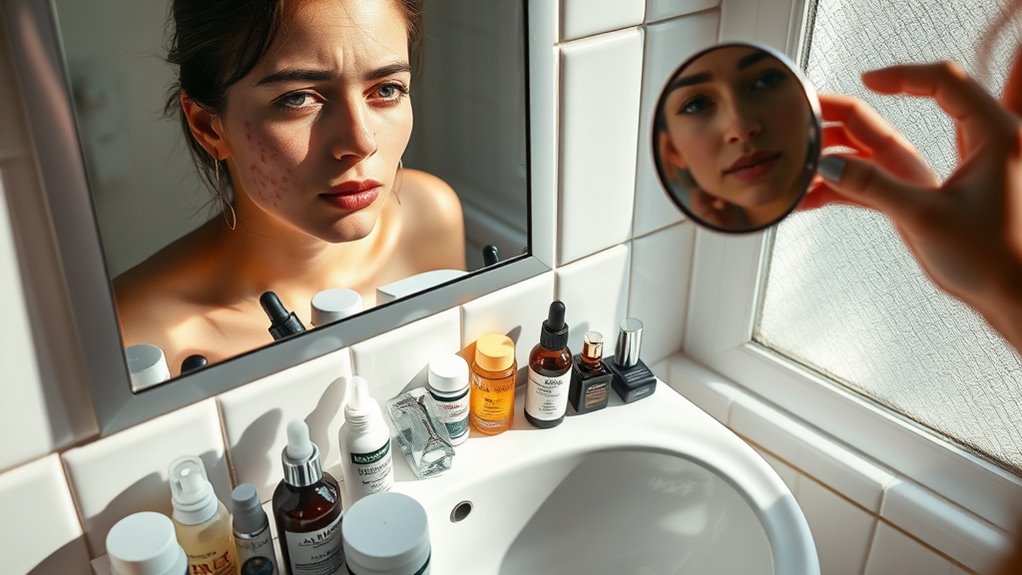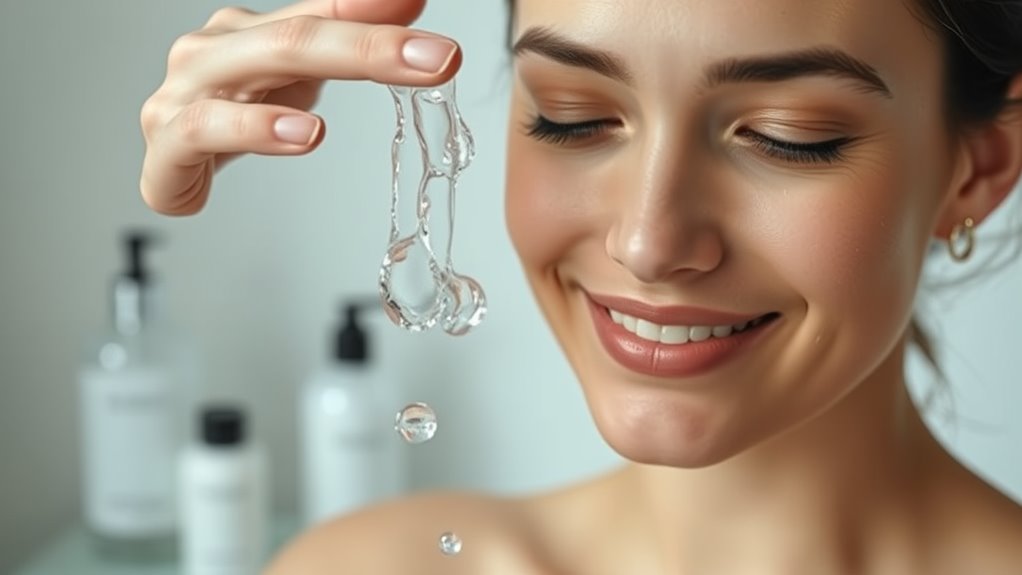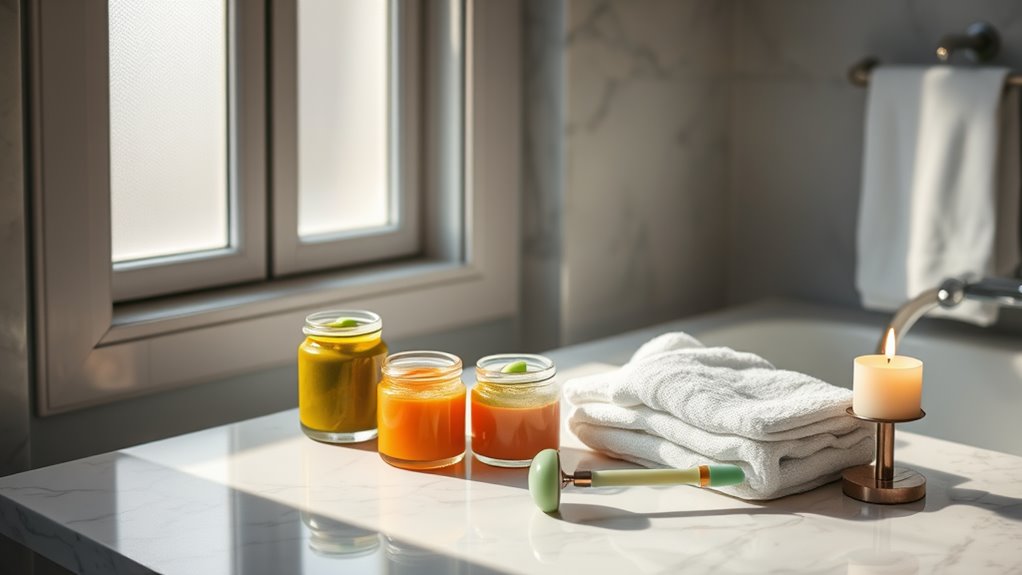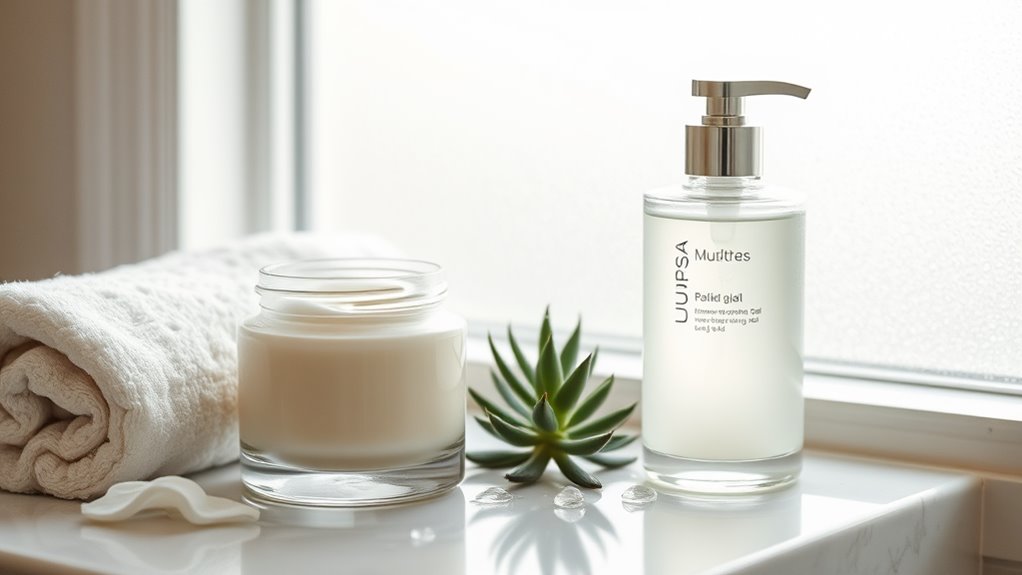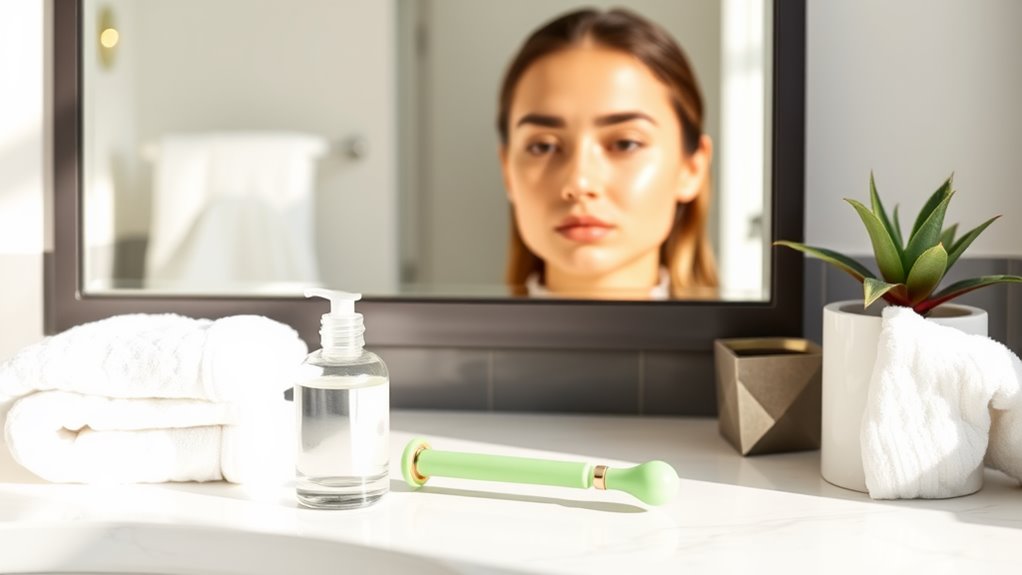Why You’re Still Getting Breakouts (And How to Stop)
If you’re still getting breakouts, it might be due to hormonal fluctuations, stress, or the wrong skincare products. Your diet and lifestyle choices can also play a big role in your skin’s health. Make sure you’re using non-comedogenic products tailored to your skin type and managing your stress effectively. Don’t forget hydration and proper nutrition either. Discovering the right combination of these elements can drastically improve your skin’s clarity and overall appearance. Keep exploring to learn more!
Key Takeaways
- Hormonal fluctuations, particularly during menstrual cycles or stress, can increase oil production and trigger breakouts.
- Using non-comedogenic and hypoallergenic skincare products helps prevent clogged pores and irritation.
- Diets high in sugar and refined carbs can spike insulin levels, worsening acne, so focus on whole foods.
- Inadequate hydration and poor sleep can elevate stress hormones, leading to more breakouts; aim for eight glasses of water daily.
- Regularly assess and adjust your skincare routine based on your skin’s response to maximize effectiveness and promote clarity.
Understanding the Root Causes of Adult Acne
When you understand the root causes of adult acne, you can tackle the issue more effectively.
Adult acne often stems from a combination of factors, including excess oil production, clogged pores, and inflammation. Stress, diet, and skincare products can also play significant roles in triggering those unwanted breakouts.
Identifying your specific triggers will empower you to implement targeted pimple solutions. For instance, if hormonal fluctuations are affecting your skin, consider adjusting your skincare routine or dietary choices.
Additionally, incorporating non-comedogenic products can help prevent clogged pores. By analyzing these root causes, you’ll not only gain insights into your skin’s behavior but also create a personalized strategy for achieving clearer skin.
Mastery in this area leads to lasting results. Understanding the common causes of adult acne can further refine your approach to treatment and prevention.
The Role of Hormones in Breakouts
Hormones play a significant role in the development of breakouts, especially for adults. Fluctuations in hormone levels, often triggered by stress, menstrual cycles, or hormonal imbalances, can lead to increased oil production in your skin.
This excess oil clogs pores, creating an ideal environment for acne-causing bacteria. Testosterone, a hormone present in both men and women, can amplify this effect.
If you’re experiencing persistent breakouts, consider tracking your hormone levels and identifying patterns that correlate with your skin issues.
Lifestyle changes, such as managing stress through exercise or mindfulness, can also help stabilize hormones.
Skincare Products: What You Might Be Using Wrong
Using the wrong skincare products can sabotage your efforts to achieve clear skin, even if you’re following a diligent routine.
Make sure you’re selecting products suited to your skin type. If you have oily skin, avoid heavy creams that can clog pores. Instead, opt for lightweight, oil-free formulations.
Likewise, if your skin is dry, steer clear of harsh cleansers that strip moisture. Check the ingredient labels; look for non-comedogenic and hypoallergenic options.
Additionally, remember that layering too many products can lead to irritation and breakouts. Stick to a few key items that target your specific issues.
Finally, don’t forget to patch-test new products to avoid unforeseen reactions. Avoiding common mistakes in your skincare regimen means being intentional about every product you use.
Diet and Lifestyle Factors That Contribute to Acne
Your skincare routine isn’t the only factor that influences breakouts; diet and lifestyle choices play a significant role too. Certain foods can trigger inflammation and hormonal fluctuations, leading to acne. For instance, high-glycemic foods can spike insulin levels, which may worsen your skin. Additionally, inadequate hydration and poor sleep can compromise your skin’s barrier, promoting breakouts. It’s also important to be aware that hidden habits can unknowingly contribute to your acne issues.
| Diet/Lifestyle Factor | Impact on Acne | Recommended Action |
|---|---|---|
| High-Glycemic Foods | Increases insulin | Opt for whole grains |
| Dehydration | Dulls skin, worsens acne | Drink more water |
| Lack of Sleep | Stress hormones rise | Prioritize rest |
Stress Management and Its Impact on Skin Health
Stress can trigger hormonal changes that lead to breakouts, making it essential to manage it effectively.
By incorporating mindfulness techniques and lifestyle adjustments, you can create a more balanced environment for your skin.
Let’s explore how stress management can directly improve your complexion.
Stress Hormones and Acne
When life gets overwhelming, it’s easy to overlook how stress hormones can wreak havoc on your skin. Elevated cortisol levels can lead to increased oil production, clogged pores, and ultimately, breakouts.
To combat this, consider these strategies:
-
Exercise regularly – Physical activity boosts endorphins, reducing stress.
-
Prioritize sleep – Quality rest helps regulate hormones, promoting skin health.
-
Stay hydrated – Drinking water flushes out toxins and keeps your skin plump.
-
Practice relaxation techniques – Deep breathing or yoga can lower stress levels.
Mindfulness Techniques for Skin
While managing stress can feel overwhelming, incorporating mindfulness techniques into your daily routine can greatly improve your skin health.
Start with deep breathing exercises; they help lower cortisol levels, reducing breakouts. Practicing meditation for just a few minutes each day enhances focus and promotes relaxation, allowing your skin to heal.
You can also try body scanning, where you mentally check in with each part of your body, releasing tension. Journaling your thoughts and feelings can help you process stressors and prevent them from manifesting on your skin.
Finally, consider mindful eating; savor each bite and choose nutrient-rich foods that nourish your skin.
Lifestyle Changes for Balance
To effectively manage breakouts, adopting lifestyle changes that promote balance is essential. Stress considerably impacts your skin, leading to increased breakouts.
Here are four actions you can take to enhance your skin health:
-
Prioritize Sleep: Aim for 7-9 hours of restorative sleep each night to rejuvenate your skin.
-
Practice Mindful Breathing****: Take five minutes daily to focus on your breath, reducing stress and promoting clarity.
-
Stay Hydrated: Drink at least eight glasses of water per day to maintain skin hydration and flush out toxins.
-
Engage in Regular Exercise: Aim for at least 30 minutes of moderate exercise most days to boost circulation and reduce stress hormones.
Implementing these changes can create the balance your skin craves, leading to clearer, healthier skin.
Effective Treatment Options for Persistent Breakouts
If you’re struggling with persistent breakouts, it’s essential to explore effective treatment options. Topical treatments can target acne directly, while lifestyle adjustments can play a significant role in your skin’s health. Incorporating natural remedies into your skincare routine can enhance your results and promote healthier skin. Let’s look at how these strategies can help you achieve clearer skin.
Topical Treatments Overview
Topical treatments are often essential for tackling persistent breakouts, with numerous effective options available to help you regain control of your skin.
Here are four powerful treatments to contemplate:
-
Benzoyl Peroxide: Known for its antibacterial properties, it reduces inflammation and clears clogged pores.
-
Salicylic Acid: A beta hydroxy acid that exfoliates the skin, helping to prevent and reduce breakouts.
-
Retinoids: These vitamin A derivatives promote cell turnover, unclogging pores and minimizing acne scars.
-
Alpha Hydroxy Acids (AHAs): These acids exfoliate the skin’s surface, improving texture and preventing future breakouts.
Incorporating these treatments into your routine can greatly enhance your skin’s clarity and health, empowering you on your journey to mastery.
Lifestyle Adjustments Impact
While topical treatments play an essential role in managing breakouts, lifestyle adjustments can greatly enhance your skin’s health.
Start by evaluating your diet; incorporate more whole foods, lean proteins, and healthy fats while reducing sugar and processed foods.
Stay hydrated—aim for at least eight glasses of water daily to flush out toxins.
Regular exercise not only boosts circulation but also helps regulate hormones that can trigger breakouts.
Prioritize sleep, aiming for seven to nine hours per night, as this is vital for skin repair.
Additionally, manage stress through mindfulness techniques or hobbies you enjoy.
By integrating these lifestyle changes, you empower your skin to thrive, considerably reducing the frequency and severity of breakouts.
Your skin will thank you!
Building a Personalized Skincare Routine for Clearer Skin
Creating a personalized skincare routine is essential for achieving clearer skin, especially since everyone’s skin is unique.
To master your routine, consider these four key steps:
-
Identify Your Skin Type: Determine if you have oily, dry, combination, or sensitive skin to choose the right products.
-
Choose Active Ingredients: Incorporate ingredients that target your specific concerns, like salicylic acid for acne or hyaluronic acid for hydration.
-
Establish a Consistent Schedule: Stick to a morning and evening routine to maximize product effectiveness.
-
Monitor and Adjust: Regularly assess your skin’s response and be willing to tweak your routine as needed. Additionally, understanding how different skin types react to various products can help you avoid ineffective choices and achieve better results.
Frequently Asked Questions
Can Certain Medications Cause Acne Flare-Ups?
Yes, certain medications can trigger acne flare-ups. If you notice increased breakouts after starting a new prescription, it’s essential to consult your healthcare provider to discuss potential side effects and alternative treatments.
How Does Sleep Quality Affect My Skin?
Sleep quality directly impacts your skin’s health. When you’re well-rested, your body repairs itself, reducing inflammation and promoting a clear complexion. Poor sleep disrupts this process, leading to breakouts and dull skin. Prioritize your rest!
Is There a Connection Between Exercise and Breakouts?
Yes, there’s a connection between exercise and breakouts. While working out boosts circulation and reduces stress, sweat can clog pores if not cleansed properly. So, always shower and cleanse your skin post-exercise to minimize breakouts.
Can Weather Changes Impact Acne Severity?
Absolutely, weather changes can impact acne severity. Humidity can increase oil production, while dry conditions may lead to irritation. Pay attention to your skin’s response and adjust your routine accordingly to maintain balance and clarity.
Do Non-Comedogenic Products Always Prevent Breakouts?
Non-comedogenic products help reduce breakouts, but they don’t guarantee clear skin. Individual skin types react differently, so you should still monitor your skin’s response and adjust your routine as needed for best results.

